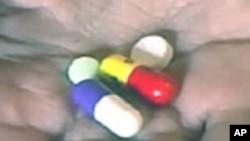"Substandard and counterfeit medicines represent a threat to public health worldwide but pose a particular problem in developing countries, where lack of financial, technical and other resources make it difficult to protect the drug supply chains," said United States Agency for International Development, or USAID, Acting Assistant Administrator for Global Health, Gloria Steele.
That is why USAID is launching a new program to combat this menace over the next five years. The USAID program will be conducted jointly with the U.S. Pharmacopeial Convention, or USP, a non-profit, non-governmental scientific organization that sets globally recognized standards for medicines and health care products.
The Promoting the Quality of Medicines, or PQM, Program, a $35 million cooperative agreement, will help improve the quality, safety and efficacy of medicines in countries around the world. These medicines are critical for the treatment of serious disease such as AIDS, tuberculosis, and malaria, and essential to USAID's priority health programs.
"Such medicines undermine decades of investments in public health," said USAID Acting Assistant Administrator Steele. "Without good quality, safe medicines to treat such diseases as malaria and tuberculosis, the impact of other health initiatives is severely weakened if not negated completely. The PQM Program focuses on this critical aspect of combating these diseases."
"The lives of patients are put in serious jeopardy when they take substandard or counterfeit drugs," said Dr. Roger L. William, chief executive officer of USP. He noted that these dangerous substances "contribute to the development of drug-resistant strains of infectious diseases. Such strains are a leading challenge in the fight against malaria, HIV/AIDs and tuberculosis."
Building on a 10-year USAID-USP partnership in this arena that assists health officials and others in 28 countries around the world, the program will increase efforts to address the significant public health challenge posed by substandard or counterfeit medicines.
Specifically, the program will help countries strengthen their medicines regulatory bodies; increase the supply of good-quality medicines; reduce the availability of counterfeit and substandard medicines; and conduct global advocacy to raise awareness of the dangers of substandard and counterfeit drugs.
The PQM Program builds on the work of USAID and USP over the past decade through a predecessor program, the Drug Quality and Information [DQI] Program. The new program will expand on these and other activities in Asia, Eastern Europe, Latin America, and sub-Saharan Africa. The United States is committed to working with its international partners to combat the growing global threat posed by counterfeit and substandard medicines.
<!-- IMAGE -->













